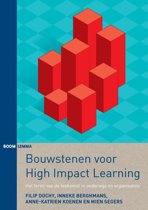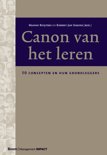
 Bouwstenen voor high impact leren: Het leren van de toekomst in onderwijs en organisaties
by
Bouwstenen voor high impact leren: Het leren van de toekomst in onderwijs en organisaties
by
 De canon van het leren : 50 concepten en hun grondleggers
De canon van het leren : 50 concepten en hun grondleggers
Holon IQ in the US has recently published The 2021 Global Learning Landscape – an open-source taxonomy for education innovation, providing a common structure and language for identifying, tracking and making sense of the volume and complexity of innovation happening in education globally. The taxonomy is described as a well-defined, robust, accessible and community enabled segmentation. For more information click the picture.
Everett, M. C. (2019). Using Student Perceptions of Collaborative Mapping to Facilitate Interdisciplinary Learning. InSight: A Journal of Scholarly Teaching, 14, 113–129. Retrieved from https://files.eric.ed.gov/fulltext/EJ1222916.pdf
This article reports on a study that investigated student perceptions of the effectiveness of collaborative mapping as a teaching strategy to facilitate interdisciplinary learning. Forty-five students enrolled in an introduction to interdisciplinary studies course participated in the study. Qualitative data, collaborative maps and student evaluations were analyzed using content and thematic analysis. Findings provide new understandings about using student perceptions of learning experiences to inform classroom practice. These understandings have implications for addressing the increasing pressure to demonstrate teaching effectiveness and learning outcomes in higher education.
Jansen, R. S., Van Leeuwen, A., Janssen, J., Jak, S., & Kester, L. (2019). Self-regulated learning partially mediates the effect of self-regulated learning interventions on achievement in higher education: A meta-analysis. Educational Research Review, 28(November). https://doi.org/10.1016/j.edurev.2019.100292
Abstract: It is often assumed that interventions aimed at supporting students’ self-regulated learning (SRL) are effective for improving achievement because these interventions support SRL activity. In this study, meta-analytic structural equation modeling (MASEM) was used to test whether SRL activity indeed mediates the effect of SRL interventions on achievement in higher education. Contrary to popular belief, the results only provide evidence for partial mediation. Furthermore, three separate meta-analyses were performed to investigate the role of possible moderators of the relations between: (1) SRL interventions and achievement, (2) SRL interventions and SRL activity, and (3) SRL activity and achievement. Although SRL interventions were effective in improving SRL activity and achievement, most of the study, measurement, and intervention moderators did not explain significant variance of the investigated effect sizes. Other factors, such as task motivation and time on task, potentially influence the effectiveness of SRL interventions. Practical, theoretical and methodological implications are provided.
Mekala, S., & Radhakrishnan, G. (2019). Promoting self-regulated learning through metacognitive strategies. IUP Journal of Soft Skills, 13(2), 21–27. Retrieved from https://search.ebscohost.com/login.aspx?direct=true&db=bsu&AN=137424419&site=eds-live&scope=site&authtype=ip,shib&custid=s1242078
Self-Regulated Learning (SRL) is effectuated through the enhancement of learners’ metacognition. Metacognition enables the learners to be conscious of their own thought process in the process of learning. Besides, it involves the learners to observe and evaluate their own thinking. Accordingly, the metacognitive strategies— planning, organizing, monitoring and evaluating—provide awareness to the learners and help in their learning progress. This paper focuses on the efficacy of these strategies to promote SRL, as it would improve the learners’ introspection on their learning process. Further, the paper explores SRL to regulate the learners’ progress and to enhance their reflective practice in the process of learning. Moreover, SRL is effectuated by guiding the learners to monitor and assess their performance in order to achieve their goal. The SRL generates an optimistic change in the learners’ responsibility towards learning and endows them with selfcontrol over their learning process. Eventually, it leads them towards Self Directed Learning (SDL) and enables them to function as autonomous learners.
Geitz, G., Joosten-ten Brinke, D., & Kirschner, P.A. (2015). Goal orientation, deep learning, and sustainable feedback in higher business education, Journal of Teaching in International Business, 26(4), 273-292. https://doi.org/10.1080/08975930.2015.1128375
Relations between and changeability of goal orientation and learning behavior have been studied in several domains and contexts. To alter the adopted goal orientation into a mastery orientation and increase a concomitant deep learning in international business students, a sustainable feedback intervention study was carried out. Sustainable feedback implies acknowledgment of students’ need to be actively involved in their own feedback process. First, relations between and changeability of the concepts found in previous research were validated. Second, the effects of the sustainable feedback intervention were analyzed. Although sustainable feedback helped mastery-oriented learners maintain deep learning, it did not directly influence their goal orientations.
Wierenga, L., & Cremers, P. (2017). Zelfgestuurd leren in innovatiewerkplaatsen. Onderwijsinnovatie, 19(1), 17-24. Geraardpleegd van https://research.hanze.nl/ws/portalfiles/portal/16162580
De arbeidsmarkt heeft in toenemende mate behoefte aan professionals die op een innovatieve manier aan complexe vraagstukken kunnen werken. Afgestudeerden moeten kunnen reageren en ook anticiperen op nieuwe ontwikkelingen en zullen zich hun leven lang professioneel en persoonlijk moeten blijven ontwikkelen. Hogescholen spelen hierop in door het opzetten van innovatiewerkplaatsen, waarin studenten leren terwijl ze werken aan opdrachten van en met de beroepspraktijk. Daarbij maken zij elk hun eigen ontwikkeling door, afhankelijk van de opleiding, taken en interesses. Om hun individuele leerproces zelf te kunnen sturen en expliciet te maken, moeten studenten goed worden begeleid en beoordeeld. In dit artikel geven de auteurs een aantal tips en richtlijnen voor docenten en coaches in innovatiewerkplaatsen.
Pande, M., & Bharathi, S. V. (in press). Theoretical foundations of design thinking – A constructivism learning approach to design thinking. Thinking Skills and Creativity. https://doi.org/10.1016/j.tsc.2020.100637
Highlights: - A constructivism learning approach to Design Thinking was proposed, - A taxonomy of constructivism learning tenets was developed, - Tenets of constructivism were mapped to different stages of the Design Thinking process, - A comprehensive teaching-learning pedagogy for Design Thinking through the application of constructivism theory was offered, - A constructivism tenets-design thinking dashboard to link constructivism to the design thinking process was created.